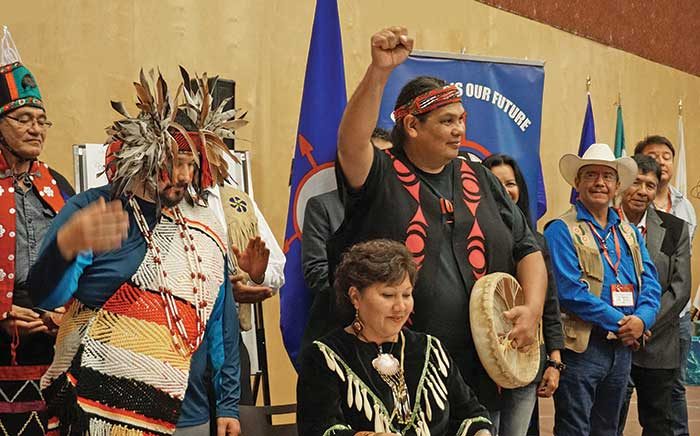Nations say ‘No’ to high-risk oil
First Nations and tribes from throughout North America have signed an Indigenous treaty that collectively denies any oil transport in their respective territories.
The signatories include about 50 nations from British Columbia, including Snuneymuxw and Tsleil-Waututh. The communities are vowing to help each other to stop all five current tar sands pipeline and tanker project proposals, plus tar sands rail projects, while instead looking towards renewable energy.
The agreement was signed concurrently in both Vancouver and Montreal and collectively challenges Kinder Morgan, Energy East, Line 3, Northern Gateway and Keystone XL.
It states that the involved nations “join together … to officially prohibit and to agree to collectively challenge and resist the use of our respective territories and coasts in connection with the expansion of the production of the Alberta tar sands.”
Grand Chief Serge Simon from the Mohawk settlement Kanesatake said the treaty means there will be more collaborative efforts between provinces to stop oil transport.
“From Quebec, we will work with our First Nation allies in BC to make sure that the Kinder Morgan pipeline does not pass,” he said. “We will also work with our tribal allies in Minnesota as they take on Enbridge’s Line 3 expansion and we know they’ll help us do the same against Energy East.”
The nations said in a collective statement that tar sands developments have already poisoned water in Alberta and beyond, and project proposals are threatening the water in many other communities in the midst of a “climate emergency.”
Chief Terry Teegee of the Carrier Sekani Tribal Council said nations are encouraged by the Supreme Court’s recent overturning of the Northern Gateway approval. “You will now see the same thing play out with all other tar sands pipelines, including another failed BC pipeline – Kinder Morgan,” he said.
Tsleil-Waututh anti-pipeline activist Rueben George of the nation’s Sacred Trust initiative was present at the signing in Vancouver. He said Indigenous people are working together in larger numbers than ever before.
“The Kinder Morgan pipeline proposal in our territory represents an unacceptable risk to the water, land and people,” he said. “We are proud to stand together with all of our relatives calling for sensible alternatives to these dangerous projects.”
By Cara McKenna




